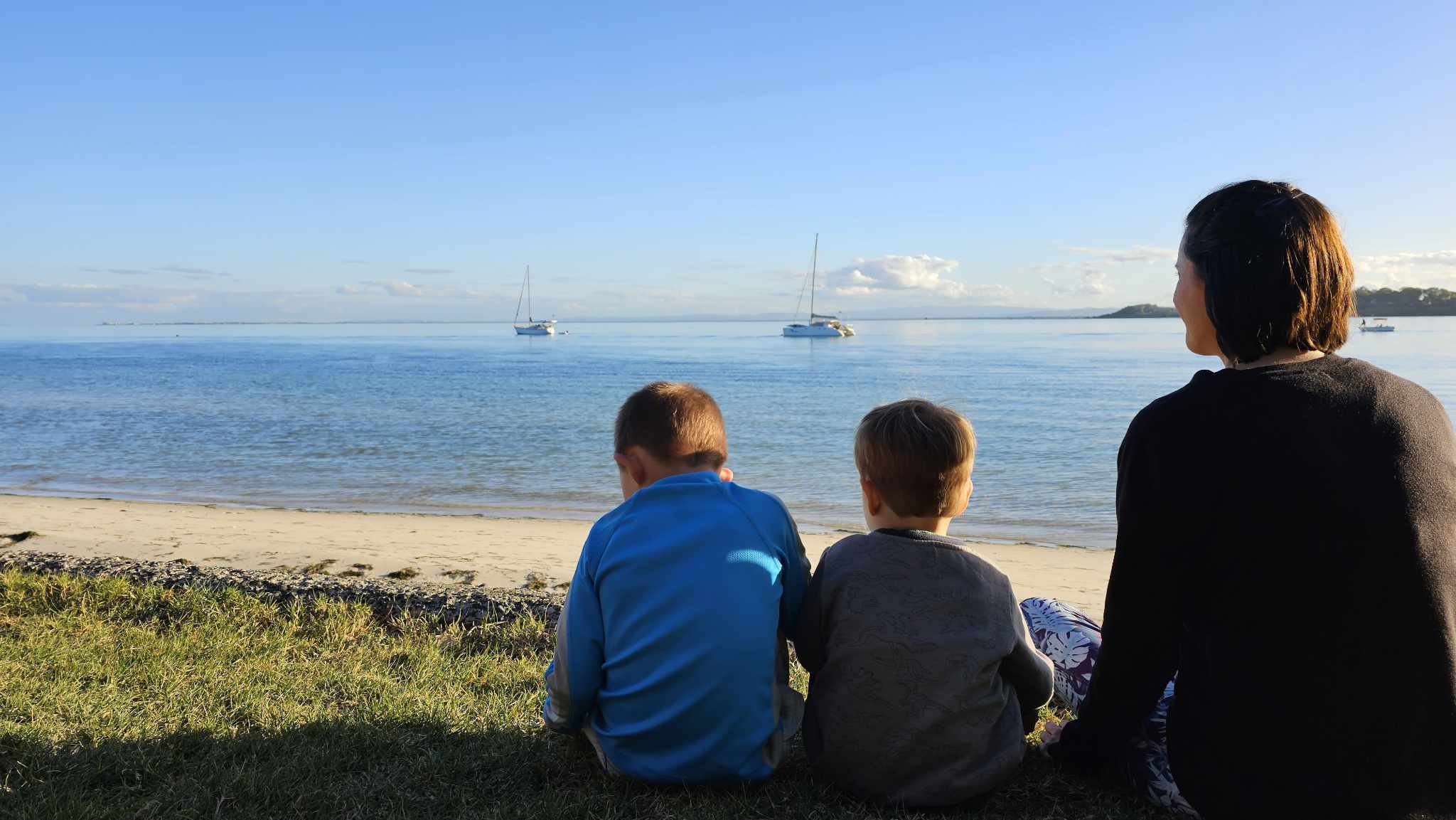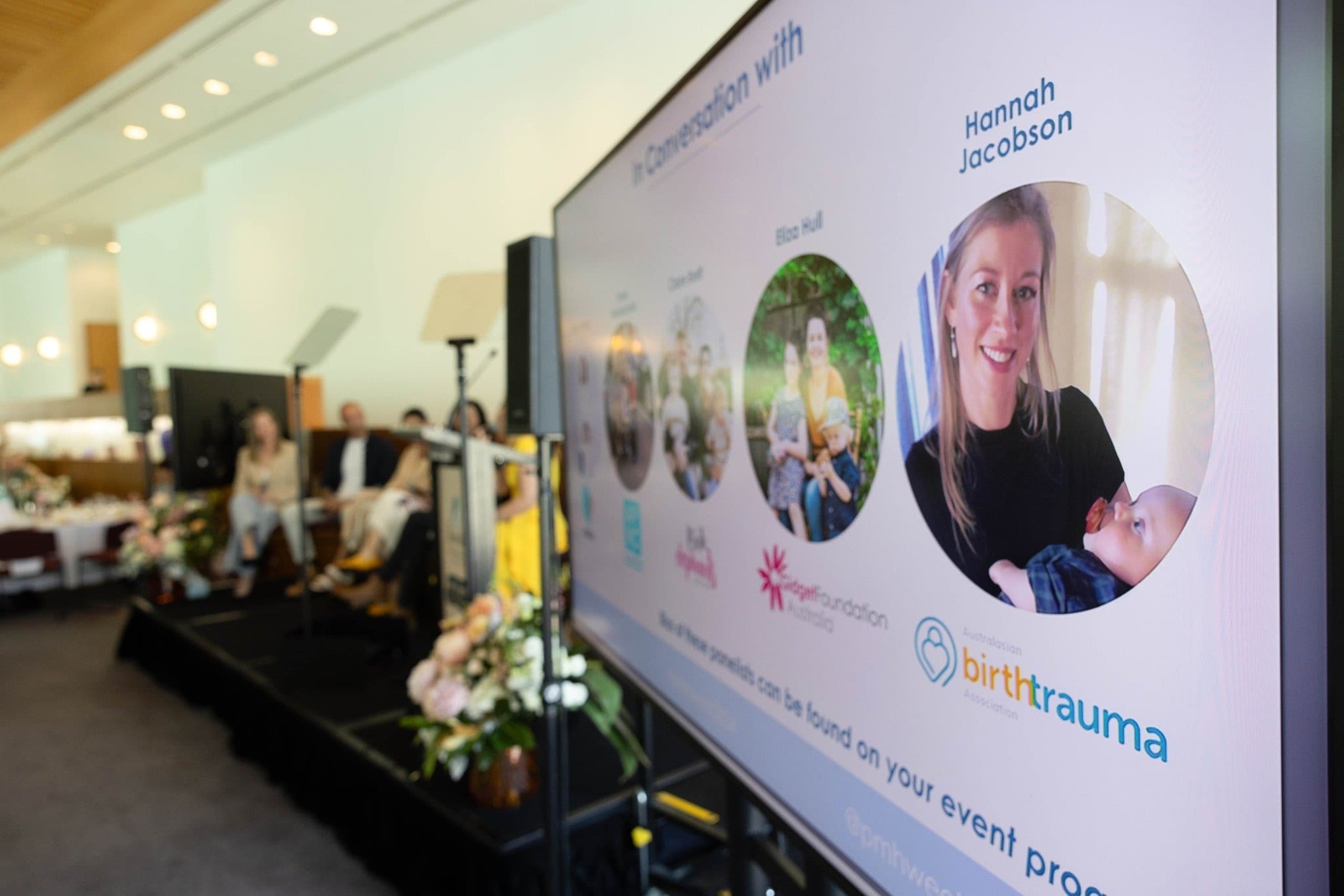Content warning: This birth story discusses trauma. Topics discussed include: PTSD, misdiagnosis, physical trauma & pain. If you are seeking support for your birth trauma, we have downloadable resources here or join one of our free Peer2Peer Support programs.
I imagined seeking help in the first few weeks post-delivery would have been easy. However, the constant message I received was that I had a new baby, and I couldn’t possibly know what I was talking about. I was told, ‘You should be in pain: you’ve just had a baby’. If I had been taken seriously, diagnosed, and treated, I would not be continuing on my journey to seek a medical professional who believes me and who can provide diagnosis and treatment options. I imagine not having to fight for five, 10, 15, or 50 years for medical treatment that should be available and accessible.
I realised I needed assistance when real physical pain shifted to time-specified remembered pain and psycho-somatic pain, from the births of my two children. and when I realised that this pain continued much longer than it should, over twelve months after the births of both children. I was not told that this was not normal, and did not realise this was not normal, until I did my own research after being dismissed by the medical profession. The neuropathic pain was so debilitating I demanded to be tested for neurological disorders and diseases. However, the GP advised the results were in a normal range, and no further investigations or conversations were offered to address a diagnosis or treatment. I had to research my own treatment options and return to my doctor to demand advice and referrals.
It was exceptionally difficult to get outstanding birth trauma and injuries addressed, and to get a formal diagnosis for PTSD. I sought assistance from two (2) hospitals, five (5) psychologists, two (2) counsellors, twenty (20) doctors, four (4) gynaecologists, four (4) pain specialists, a women’s out-patient clinic, three (3) physiotherapist(s), a pelvic pain diagnostic clinic, multiple ultra-sound clinics most not specialised in treating women with chronic pain, multiple MRIs from clinics not specialised in treating women in chronic pain. I also presented to an emergency department on multiple occasions in extreme pain, being barely able to walk.
The medical staff laughed at my extreme reaction of pain to a physical examination and dismissed me as a stupid woman who should see her GP.
If I had been believed, and if the medical profession had actually taken the time to listen and collate the injuries caused by both births, I understand I would not be in chronic pain and that this would have reduced the impact of undiagnosed PTSD. I understand I could have returned to a healthier life much sooner. I would have benefited from a full and targeted medical examination to determine birth injuries and a comprehensive mental health assessment for birth trauma before I left the hospital.
The things that further compounded trauma were: poor medical advice; a lack of compassion and empathy, being labelled a problem; having to research and demand referrals to specialists and scripts for medication; medical staff dismissing my need for information and/or dismissing my questions as inappropriate or un-important; specialists not talking to one another despite being part of a medical care plan and being provided with records; poor or no advice on treatment options; and poor or nominal advice on medications available.
The significant barrier I found was that each medical professional or specialist had a different language for a condition or would use jargon to dismiss the issues I raised. The second significant barrier is the lack of treatment for a ‘young’ person (person under 50 years???), as Western medicine appears to focus on the absolute failure of the body or a body part before action is taken rather than preventative measures.
Only two mental health providers have ever inquired about my physical health.
The helpers were those generally outside of the medical profession or who had a holistic view of the body. By understanding and processing this, I found alternate therapies, including meditation, hatha yoga, gentle pilates, Bowen therapy, acupuncture, EMDR and hypnotherapy, nutrition, naturopathy, iridology, and osteopathy, critical to understanding and managing my injuries. I also found a ‘home connect’ service critical to drawing attention to my immediate family that I did need help, I wasn’t okay. I did need to prioritise my self-care as a mother, and this was okay.
What would I have liked to have happened….
- I imagine that when I presented to various GPs after having my first child, they (discrimination and hypochondriac dismissal are not gender-specific) would have shown compassion and empathy and listened, with appropriate medical advice and guidance available and given.
- I imagine being treated with dignity and respect and being managed as a person with medical needs, and having areas that could be a problem – such as prolapsed organs, muscle fatigue, internal organ changes, and damage – monitored and managed during pregnancy.
- I imagine being provided with a health care plan before I left the hospital with direct access to outpatient clinics to diagnose nerve pain, bladder pain and dysfunction, bowel pain and dysfunction, pelvic floor pain and dysfunction, pelvic and hip muscle and tendon dysfunction, damage to bones including hips, coccyx and spine.
- I imagine having my mental health assessed before I left the hospital and leaving with a mental health care plan and access to a mental health care professional.
- I imagine the child and the mother being the focus of care and being given options to care for my child, which correlate to my body needs, including breastfeeding or bottle feeding rather than being told only the child matters and therefore ‘breast is best’.
- I imagine being given reasonable and fit-for-purpose medication that has proven results and is not just tested on men or rodents.
- I imagine returning to see the same medical professional from pregnancy to delivery, and them being present at the patient handover to move forward with my journey of recovery.
- I imagine having reliable and accessible information so that I don’t have to seek complementary alternate therapies; these are already researched, connected, and available within the medical community, accessible through an outpatient clinic with childcare.
- I imagine being asked, “Can we offer subsidised home services to help you in those first few weeks of being a new parent?” and not being dismissed as just a thing required to cope with.
And I would finish with this: the medical profession, policy framework, and overall community let down women so badly there are no words to describe the disgust I feel. But you underestimate us, for we are the warriors who get up in pain, attend to life and our families, and return to bed in pain. And for most of you, you shall never know because you do not dare ask. Shame on you. For the small group supporting women but also supporting your woman, we need more of you, and should you be hidden, please rise, as we need you more than you will ever know.
If you’d like to chat to someone about your birth experience and start getting support today, please reach out to one of our friendly Peer2Peer Support Team.





One Response
*please rise*
What a powerful story and my full respect to you Adena.
My babies are now 5 and 6 and PTSD from birth trauma is with me everyday.
How I wish greater care and consideration was provided to me as a mother,
After the traumatic birth of my first son, where I woke up ALONE in a recovery room, I was in a panic..unable to leave the bed die to the emergency cesearian and my mind kept replying hearing the sound of silence.
my first born was unresponsive and was resuscitated and taken away.
The anguish and pain of waking up alone won’t leave me. I was wheeled into him hours later and in the morning when I woke up I had to scream from my room (I think nurse staff were changing shifts ) and a cleaner or hospital worker heard my distress and overuled the staff and wheeled me to my baby.
I won’t go into the second birth, but all plans went out the window and I was left feeling so so sad.
to all the mums out there, I see you.
how I wish staff asked how I was?
why did I cry every day in hospital?
why did the counsellor who was meant to turn up at the birth didn’t.
so many little things could have been done differently. the little things matter.
how I wish that grandma’s or woman volunteered in hospital or it was manditory for mums to be around. I could have used some support.
almost 7 years into my diagnosis of PTSD and I live with and manage symptoms every day.
years to get diagnosed.
if you are out there and reading this. be kind to yourself.
you are not alone, you are brave and special and important.
please try and find a doctor and psychologist who listens and understands and allows self compassion.